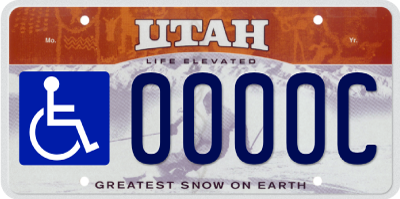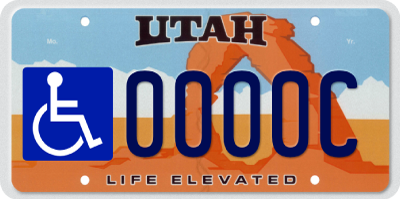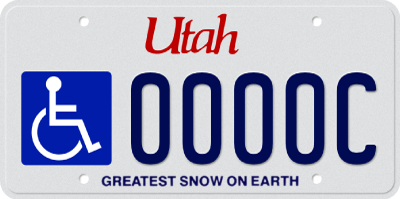Disabled Plates and Placards



Qualifications for Disabled Parking
Individuals with disabilities can qualify for disabled person’s license plates, which are mounted on their cars in place of regular license plates, or disabled person’s placards, that are hung from the rear view mirror of their cars. These plates or placards allow the disabled person to park in specially marked parking areas that are convenient to the entrances of public buildings. The plates may be personalized.
State law defines a “disabled” person as one who:
- cannot walk 200 feet without stopping to rest;
- cannot walk without the use of, or assistance from, a brace,
cane, crutch, another person, prosthetic device, wheelchair, or
other devices; - is restricted by lung disease to a specific standard;
- uses portable oxygen;
- has a cardiac condition to a specific standard; or
- is severely limited in his or her ability to walk, due to an arthritic,
neurological, or orthopedic condition.
Although many people, such as new mothers, people with minor injuries and others, can obviously benefit from the use of disabled parking privileges, each case must meet one of the six criteria listed above in order to qualify.
Re-certification of qualification is not required for disabled plates or permanent placards. A new certification is only required if obtaining temporary placards.
Plates must be surrendered upon death or inability to use.
Placards’ Length of Validity
Permanent Placards do not expire. Only the initial doctor’s certification is needed for issuance.
Temporary Placards are valid for up to six months. As with the permanent placard, a physician’s certification is required describing the nature and expected duration of the disability. However, a temporary placard cannot be renewed. Should your temporary disability continue past six months, you may apply for another temporary placard upon obtaining a new physician’s certification.
Steps to Obtain a Disabled Plate or Placard
Steps to Obtain a Disabled Plate or Placard
Get Doctor’s Certification
The form TC-842, Disabled Person And Physician Disability Certification must be completed by a licensed physician, physician assistant, physical therapist, or nurse practitioner.TC-842Choose Between Plate or Placard
You are allowed to have as many disabled plates as you have vehicles but you will be limited to only one placard (paper or durable), that may be used in any vehicle while transporting a qualified disabled person.
If the disabled person is not issued any disabled license plates, a total of two placards may be issued to the individual.
There is no fee for the initial or replacement of paper disabled person placards. However, there is a $2.50 fee per durable material placard (limit 2).
Disabled PlateApply for Disabled Parking Permit
First you must obtain a completed form TC-842, Disabled Person And Physician Disability Certification. The form’s “Physician’s Disability Certification” section must be completed by a licensed physician, physician assistant, physical therapist, or nurse practitioner.
For more information about applying for a Disabled Person plate please visit our Disabled Person Plate page.
Local Offices
You may apply for a disabled person’s plate or placard at your local Motor Vehicle office.
Appointments available at the Ogden, Farmington, Taylorsville, South Valley (Draper), Provo, and Hurricane DMV offices
Make an AppointmentPostal Mail
Mail your completed TC-842 to:
Motor Vehicle Division (DMV) Mail and Correspondence
PO Box 30412
Salt Lake City UT 84130Check Fulfilment Status
You can check the status of your plates by using our License Plate Status tool.License Plate Order Status
How to Display a Placard
The placards must be hung from the rear view mirror so they are visible from the front of the vehicle. Do not display the placard while driving.
Where You May Park
Any vehicle displaying a disabled person’s plate or placard may, for reasonable periods of time without charge, park in metered parking zones and restricted parking areas. They are not valid for parking in zones marked for emergency use.
Only vehicles displaying a disabled person’s plate or placard, and transporting a qualified disabled person, may park in a parking space that is clearly identified as reserved for use by a disabled person.
Replacing a Lost Placard
Parking Placards can be easily replaced by:
- Visiting your local DMV office
- emailing [email protected] to request a replacement
There is no fee to replace a paper temporary or paper permanent placard. However, there is a $2.50 fee (per placard) to replace a durable permanent placard (limit 2).
To replace your temporary or permanent placard, you must make a request in person at any DMV office, or by mail:
Motor Vehicle Division (DMV) Mail and Correspondence
PO Box 30412
Salt Lake City, UT 84130
**If replacing a durable permanent placard, please send a request with a check made out to Utah State Tax Commission.
Honoring Plates and Placards from Other States
The parking privileges granted to disabled residents of Utah are also extended to residents of other states, Canada, or Mexico while visiting Utah.
Abuses of Disabled Parking Privileges
If you see what you suspect is a violation of disabled parking privileges, you should contact your local law enforcement agency.
Issuance of Permanent Placards to an Institution
Companies or organizations that, as part of their business, routinely transport disabled persons, may be issued disabled plates for each vehicle used for transporting disabled persons, provided that the vehicle is registered in the company’s name.
Additional permanent parking placards may be issued on the basis of need. Companies that do not routinely transport disabled people may not be issued disabled plates for vehicles registered in the company’s name.
To obtain placards for an institution, a representative from the institution should complete Form TC-842, Disabled Person and Physician Disability Certification, and complete Section 2 on the form, the “Disabled Person Care Facility Certification.”
Disabled Plates and Placards FAQ
I have a permanent or a temporary disability. How do I get a parking placard or license plate?
While disabled parking placards are available to those with either permanent or temporary disabilities, disabled license plates are only available to those with permanent disabilities.
You and your doctor will need to fill out and sign Form TC-842, Disabled Person and Physician Disability Certification. Once completed, simply submit the application to the DMV and you will receive your parking placards. You are limited to either two windshield placards or one windshield placard and disabled plates for as many vehicles as you have registered in your name.
My parking placard needs to be renewed. How do I do that?
For placards that were issued before July 1, 2024 the DMV sends out renewal notices for permanent parking placards that need only be signed and mailed back to the DMV. The DMV will then mail the new (non-expiring) placards to you. Placards that are issued after July 1, 2024 do not expire. If a renewal notice wasn’t received or has been lost, you may renew online or visit your local DMV office or call us at (801) 297-7780 or 1-800-368-8824 and renew the placard over the phone or email us at [email protected].